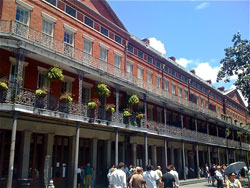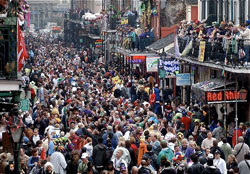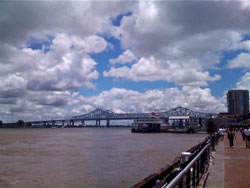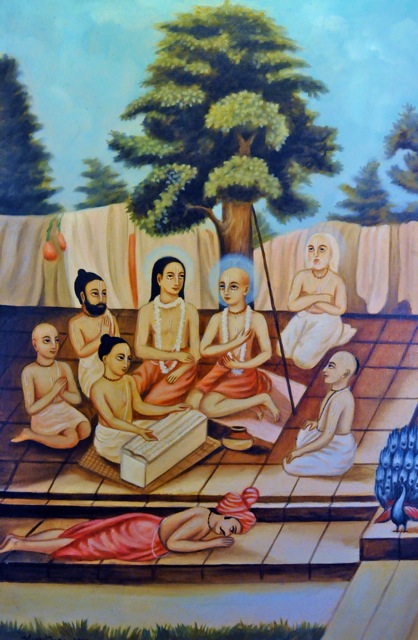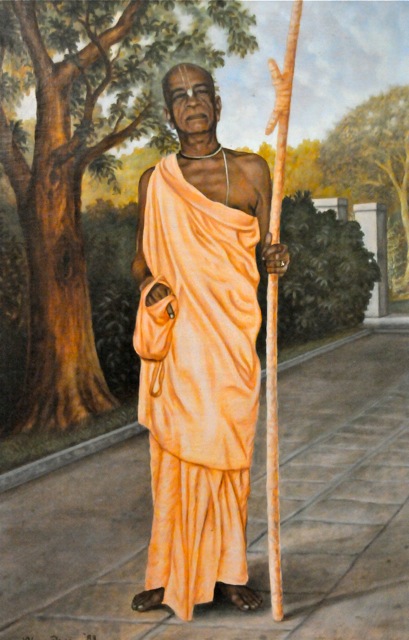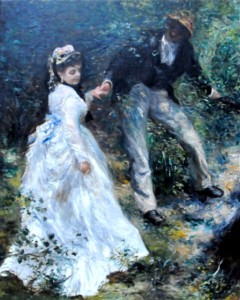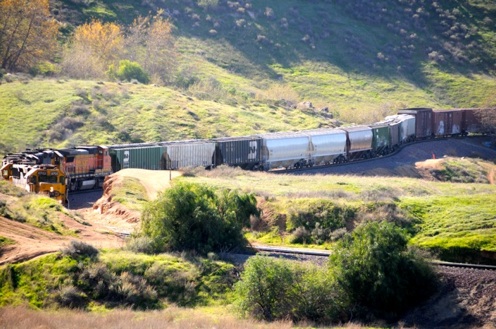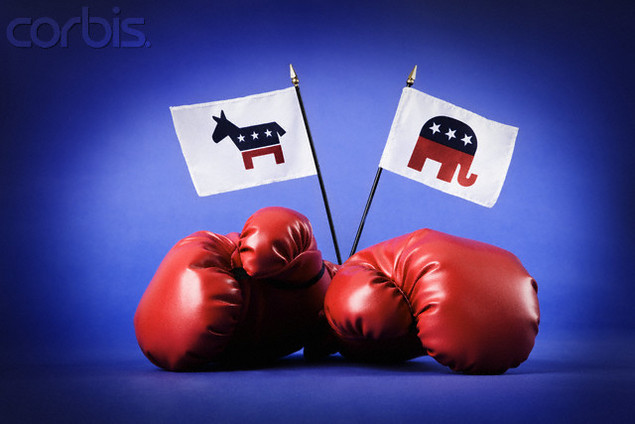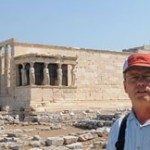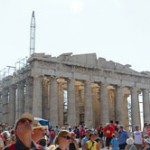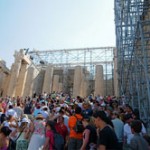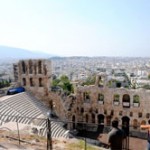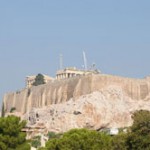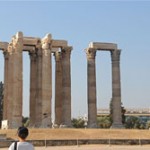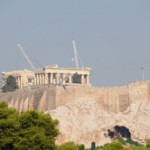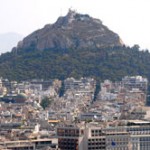September 30, 2008
We, in America, are living in extraordinary times. President W. Bush appeared on television last night and plainly stated that our country was in grave danger because our banking system was about to collapse and we should all agree to a severe economic bail-out proposed by the government. Think about this: The president of the United States was publicly announcing that our way of life is about to come to an end. He even mentioned the ‘p’ word, panic, in referring to a run on the banks. This is Great Depression language. Where did this come from? We knew the real estate markets have been in trouble for the last year, but a few weeks ago we were told that the essentials of our economy were strong. We thought this was just another down-cycle like we have seen many times before. Now we were being told that our economy was on the brink of total destruction because the banking system was about to collapse. The president was asking the American tax payers to ‘bail out’ so many failing banks and other financial institutions. There is a lot of shock and anger in this country over why our leaders have failed to manage the economy and why the tax payers should bail out the rich financial sector. In fact, the bank that holds the mortgage to my house, just this evening collapsed, and so this problem has now even touched my life.
Naturally, I have been watching the news and studying this issue for the last few days because, honestly, after Iraq, I do not trust the Bush administration. I have friends who work in the mortgage and finance industry and it seems that it is true, the American banking system is indeed close to some degree of collapse. This is amazing. I thought this is what happens in countries like Russia or some third world country, certainly not in America, the seat of capitalism and world leader in financial security. Anna, the world of high finance is extremely complex, technical and certainly beyond my reach. There are also games being played that I can never be privy to, so it is hard to comment on the details of what is occurring, but in general terms here is what I have discovered and what I think about this current crisis.
As you know, this country and ultimately most of the world experienced a major economic depression starting in 1929 that lasted well into the 1930s and in some countries even into the 1940s. Today this is called the Great Depression. How did this come about? Many theories and details are there, but from my perspective the matter can be reduced to very simple terms. Human nature is essentially greedy and the competitive demands of life create a situation that, given no restrictions, human beings will hoard wealth, manipulate markets and put themselves into advantageous positions even to the detriment of others. This was the situation of the 1920s when the global financial system was still relatively young and there were few restrictions on the banking system by government. Collectively those in the financial and banking sectors took advantage of their positions and manipulated the markets until the whole system finally collapsed leaving the rest of the world to suffer and pick up the pieces. As a result, in 1933 the American government established a set of laws meant to curb human nature and protect the rest of the society from the greed of those working in the financial industry. This was the Glass-Steagall act (GSA) established during the Roosevelt administration that regulated the way banks could operate and how the stock market functioned. Today most people only know of this act through the Federal Deposit Insurance Corporation. You can see the FDIC logo that is displayed at every bank in this country and which protects every bank account up to $100,000 in the event of a bank failure. But there was a lot more to this act than just the FDIC. The Glass-Steagall laws strictly controlled the flow of capital through the American banking, insurance and market systems. In effect these laws were restrictions on laissez-faire economics, a form of capitalism that says that government should stay out of the market and let the market place regulate itself. This idea is premised on the idea that natural market laws will self correct any imbalances or inequities that may occur. The Glass-Steagall act in effect said laissez-faire economics does not work and so the government must play a role in the market place to regulate and prevent exploitation by those in power.
For almost 60 years these laws functioned with general success, however, there has always been pressure to soften or even repeal this act as many felt it was an over reaction to the situation of the 1920s. In other words, the government was playing too great a role in the market place. During the 1980s when Ronald Reagan, who was a strong advocate of laissez-faire economics, became president he began to promote his brand of laisser-faire economics, now called “reaganomics.” The result was that under Reagan a general deregulation of government began which led to the softening and eventual repealing of the Glass-Steagall laws. It took over a decade, but eventually the GSA was terminated in 1999 when Bill Clinton signed into law the Gramm-Leach-Bliley Act or what is also know as the Financial Services Modernization Act. The net effect of this repealing of the Glass-Steagall act has been to return this country, more or less, to its pre 1929 laissez-faire economics, and now, just nine years later, it appears that we are again looking at a repeat of the crash of 1929.
In writing this I realize that I am ignoring a lot of history and perhaps overly simplifying things, however, I do feel that there is enough truth in what I am writing to let it stand. I have come to the conclusion that laissez-faire economics does not work and government does indeed have an essential role to play in the market place. What we are witnessing is not just a natural adjustment of the market place, but a structural failure of laissez-faire economics. It happened in 1929 and it is happening again in 2008, and in both cases it is largely the result of a lack of regulation and oversight by government. The market place does not always self regulate and correct itself.
Anna, I come from a country that has always had a relatively high amount of government involvement in the market place, or as one commentator has put it, I was raised on the mother’s milk of socialism. I am from Canada and socialism lays at the foundations of Canadian society. All Canadians have access to health care and higher education and a host of other ‘essential’ services. The down side, of course, is that Canadians pay a lot more in taxes and have to tolerate much more government involvement in their private and public affairs. Canada, as a society, is more like a Western European society than the United States, so I am tolerant of more governmental involvement in the market place than the average American. Coming to this country and finding just how much the individual is left on his own compared to what I was used to in Canada was a shock and it took me many years to understand the situation and to adjust to it. In this country money rules and if you do not have it, you are truly on your own. What passes for public welfare and healthcare in this country is demeaning. There is little in the way of a respectable social net to fall back on. There is no health care or higher education automatically provided for you in this country. You must create it for yourself. This is the essential difference between Canada and the United States, and without question my political opinions have been shaped by my socialistic Canadian upbringing. However, I have had one further experience that has had just as profound an influence on the shape of my political and economic views, and which also affects my perceptions of this current economic crisis: I have lived in a communist state.
I consider my life within ISKCON and in particular my years in New Vrindavan to have been a time lived under a form of communism, that I call spiritual communism, but communism none the less. This came about as a result of my desire and need to pursue a utopian philosophy during my youth. I have already described how I was affected by the utopian ideals of Thoreau’s, simple living and high thinking. The particular form of this utopianism that I followed was theocentric and it came under the motto of “just chant Hare Krishna and be happy.” Within ISKCON Krishna took the role of the State and was the owner all things and we, His devotees, were only the stewards of creation. What seemed like a peaceful and innocent philosophy when put into practice quickly takes on a marxist flavor. In a small city temple the application of this kind of thinking could only go so far, so it was hard to see the implications of such a philosophy, but in a relatively large and remote rural community, such as New Vrindavan, the actual practice of this theology could go a lot farther and I could see the end result. I quickly learned that God’s ownership, translated into community or state power. The Guru as God’s representative became the supreme ‘monarch’ and so I even began to see the divine right of kings begin to unfold. What began as a utopian philosophy of simple living and high thinking with God at the center soon began to manifest the political philosophies of theocracy, monarchy and communism all mixed within the same crucible. I have written about this in great detail elsewhere, but to summarize, I learned that however perfect you try to make it, when theological power and political power become intertwined you are on your way to creating a totalitarianism. This is what happened in New Vrindavan. My years within this community afforded me the unique opportunity to witness life at its most formative and basic levels. On a miniature scale I saw how monarchies are created, how controlling elites take power, how communism works and how totalitarianism forms.
Regardless of whether you call the supreme authority God or the State, when an outside power owns everything it really means no one owns anything and so everything becomes abused, stolen or lost. Society becomes massively inefficient. When no one has a right to the fruits of labor, in other words, when you do not get paid for work, individual initiative is destroyed. When the individual is subordinate to God or the State, individual human rights cease to exist. When people do not receive due compensation for their labor, secret economies develop, bribing and payoffs become common and corruption becomes rampant. I saw all of this first hand. My life in New Vrindavan, because it involved building a society from the ground up, taught me volumes about life. Even though it was on a small scale, I have participated in the formation of a political system, a legal system, an educational system, a health care system, and so on. So, when I finally left New Vrindavan, I had learned things that most people never get an opportunity to experience. I had had a belly full of marxism and I had become a passionate capitalist fully embracing the ideals of laisezz-faire economics. I had seen the evils of utopian philosophies and I even though I grew up under Canadian socialism and later touched the extreme left in the form of spiritual communism, I had rebounded to the right, to laissez-faire capitalism. Now in these days I as am seeing the collapse of American capitalism under Reaganomics, it brings me back to my centrist Canadian roots: Government does have an essential role to play in the market place.
As I write this final paragraph the United States congress has just passed a massive bailout bill which allows the government to buy up all of the so called ‘toxic’ loans related to the current financial crisis started in the real estate markets. Is this a good thing? I have no idea. We are told by the experts that it is necessary in order to prevent the US economy from total collapse. Only time will tell if this strategy works. At any rate, whether it works or not, what will happen over the next few months is that some form of 21st century Glass-Steagall laws will be enacted. Laissez-faire economics is dead for another two generations in this country, but I doubt this country will ever make it to the point of socialism like a European democracy in my life time. And honestly, I hope it never does. I am convinced that part of the greatness of this country lays in his wildness and inability to be tamed. But it all comes at a price.
The following is a paragraph clipped from the New York Times on October 27th 2008:
On Thursday, almost three years after stepping down as chairman of the Federal Reserve, a humbled Mr. Greenspan admitted that he had put too much faith in the self-correcting power of free markets and had failed to anticipate the self-destructive power of wanton mortgage lending.
“Those of us who have looked to the self-interest of lending institutions to protect shareholders’ equity, myself included, are in a state of shocked disbelief,” he told the House Committee on Oversight and Government Reform.
The following announcement was just made by the incoming Obama administration concerning the reinstatement of financial regulations.
Sun Dec 7, 11:08 am ET
WASHINGTON (Reuters) – President-elect Barack Obama said on Sunday he would put strong new financial regulation at the center of his economic recovery program to force more accountability on the banking industry.
Obama again warned that the U.S. economic crisis, which saw the country lose more than half a million jobs in November alone, would worsen before it gets better.
“As part of our economic recovery package what you will see coming out of my administration, right at the center, is a strong set of financial regulations,” Obama said in a taped appearance on NBC’s “Meet the Press” television show.
“Banks, ratings agencies, mortgage brokers, a whole bunch of folks (will) start having to be much more accountable and behave much more responsibly.
“We’ve got to have transparency, openness, fair dealing in our financial markets and that’s an area where I think over the last eight years we’ve fallen short.”

